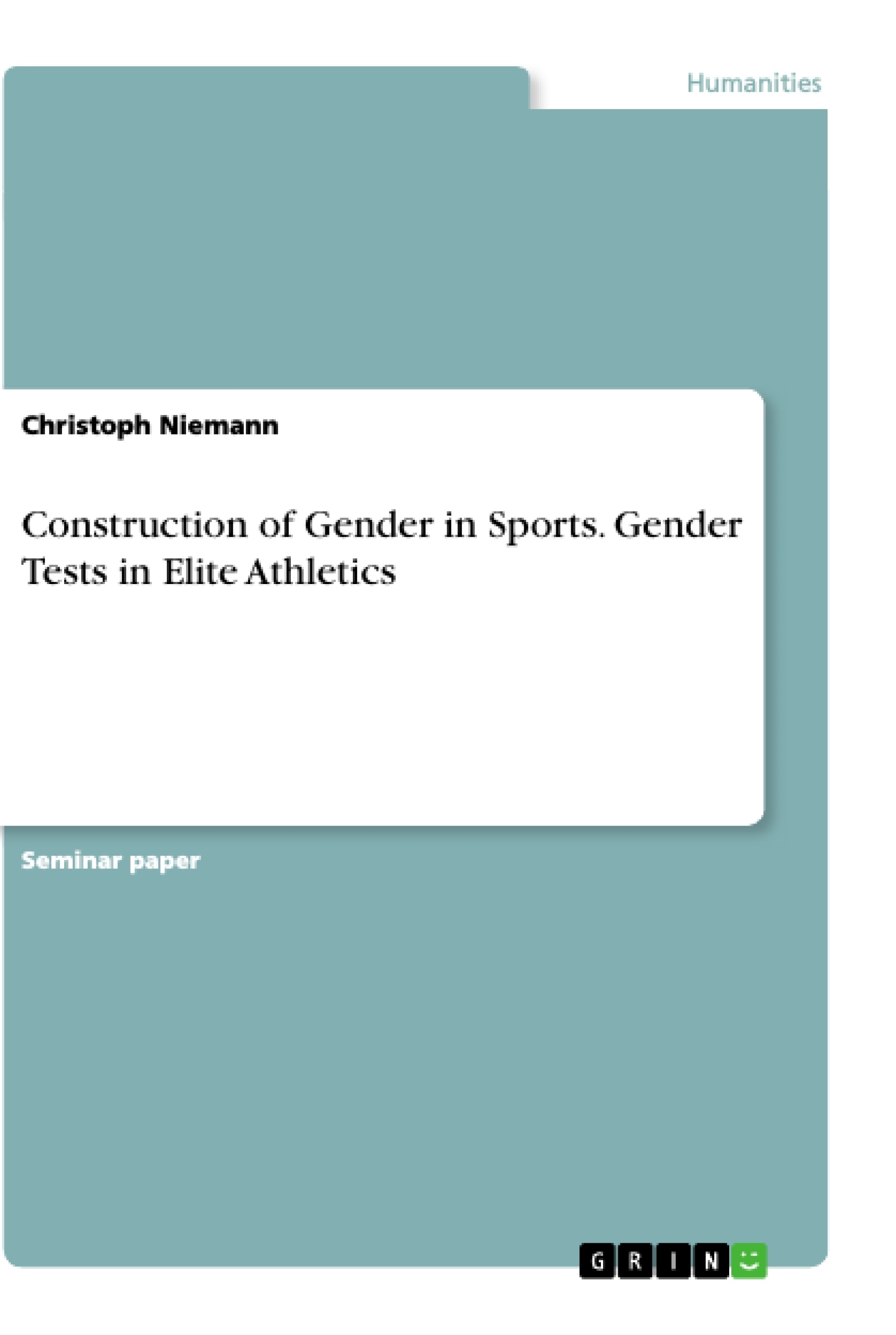In the context of this thesis the topic of the gender construction is taken up. Subject areas of the social and natural sciences try to find the causes of the gender-specific differences with the aid of various theories.
At first, an analysis of the relationship between society, gender and sport should make it clear how the social subsystem Sport was influenced and structured by everyday theory. Using the example of the controversial phenomenon of sex tests in sport, it should be shown that the gender of a person cannot be measured using biological-medical criteria only. This thesis is contrary to the widespread opinion in medicine and biology that sex can be clearly determined based on five criteria. Therefore, a fundamental understanding of the procedure and basics of gender testing should be created by summarizing these criteria. In a second step, it is shown that it is possible by a social-scientific point of view to question hypotheses of a purely biological, pre-social nature of man. A basic insight is that the society in which we live is a result of our own actions. The everyday distinction between man and woman is an expression of attribution that does not refer to the individual but to the cultural system.
It raises the question of the social aspect in the gender categorization. This questions the collective assumptions of the binary system of attribution as it considers the process of forming different genders in the social world.
Inhaltsverzeichnis (Table of Contents)
- Introduction
- Relationship between society, gender and sport
- Gender verification in sports
- Socio-historical background
- The genesis of the biological sex
- The genesis of the social sex
- Procedures in sports
- The challenge of intersexuality
- Summary
- Bibliography
Zielsetzung und Themenschwerpunkte (Objectives and Key Themes)
This thesis investigates the social construction of gender and explores how this construction manifests in the realm of elite athletics, specifically focusing on the phenomenon of gender verification tests. The main objective is to demonstrate that gender cannot be solely determined through biological-medical criteria and to challenge the prevailing view that sex is definitively defined by five established criteria. Through a social-scientific lens, the thesis examines the relationship between society, gender, and sport, showcasing the impact of social norms and ideologies on athletic practices and perceptions.
- The social construction of gender and its impact on sport
- The historical development of gender verification tests in athletics
- The limitations of biological-medical criteria in defining gender
- The role of social norms and ideologies in shaping perceptions of gender in sport
- The social implications of gender verification tests and their impact on athletes
Zusammenfassung der Kapitel (Chapter Summaries)
The introduction of the thesis sets the stage by discussing the case of Caster Semenya and the controversy surrounding her gender verification test. It emphasizes the societal assumptions surrounding gender and the need to challenge the binary system of attribution.
Chapter 2 delves into the relationship between society, gender, and sport, tracing the historical development of sport as a social subsystem and highlighting the impact of societal norms on women's participation in athletics. It examines how the concept of gender shifted from a primarily social to a predominantly biological framework, and how this shift influenced the perception of gender-specific physical differences.
Chapter 3 focuses on gender verification in sports, exploring its socio-historical background and outlining the motivations behind the implementation of sex tests. The chapter discusses the various biological-medical criteria used for sex verification and the challenges associated with these procedures, particularly in cases of intersexuality.
Schlüsselwörter (Keywords)
The key focus topics of this thesis include gender construction, sex verification, intersexuality, sport, athletics, social norms, ideologies, and the social implications of gender testing. It draws upon theoretical frameworks from the fields of sociology, anthropology, and sports science to analyze the complex relationship between gender, society, and sport.
Frequently Asked Questions
Can gender be definitively determined by biological criteria?
This thesis argues that gender cannot be measured by biological-medical criteria alone, as social and cultural attributions play a significant role in gender categorization.
What are "gender tests" in elite athletics?
They are medical procedures used to verify an athlete's sex, often triggered by controversial cases like that of Caster Semenya, to ensure fair competition in binary categories.
What is the "binary system of attribution"?
It is the societal assumption that there are only two distinct genders (man and woman), which the thesis questions through a social-scientific lens.
How does intersexuality challenge sports regulations?
Intersexuality demonstrates that biological sex is not always binary, complicating the implementation and ethics of gender verification in elite sports.
How has the concept of gender shifted historically in sports?
The concept shifted from a primarily social framework to a predominantly biological one, influencing how physical differences between athletes are perceived and regulated.
- Quote paper
- Christoph Niemann (Author), 2019, Construction of Gender in Sports. Gender Tests in Elite Athletics, Munich, GRIN Verlag, https://www.grin.com/document/542747



